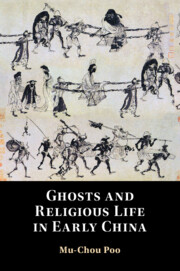Book contents
- Ghosts and Religious Life in Early China
- Ghosts and Religious Life in Early China
- Copyright page
- Contents
- Preface
- 1 Ghosts
- 2 The Emergence of Ghosts in Early China
- 3 Imperial Order and Local Variations
- 4 Stories That Reveal the Dark Corner
- 5 Ghosts in Early Daoist Culture
- 6 The Taming of Ghosts in Early Chinese Buddhism
- 7 Chinese Ghosts in Comparative Perspective
- Bibliography
- Index
1 - Ghosts
The Other Side of Humanity
Published online by Cambridge University Press: 13 January 2022
- Ghosts and Religious Life in Early China
- Ghosts and Religious Life in Early China
- Copyright page
- Contents
- Preface
- 1 Ghosts
- 2 The Emergence of Ghosts in Early China
- 3 Imperial Order and Local Variations
- 4 Stories That Reveal the Dark Corner
- 5 Ghosts in Early Daoist Culture
- 6 The Taming of Ghosts in Early Chinese Buddhism
- 7 Chinese Ghosts in Comparative Perspective
- Bibliography
- Index
Summary
In modern Chinese language, the concept or the term ghost (gui 鬼, see discussion below) appears very often, although people today may not really believe in the existence of ghosts. We often hear such expressions as “seeing a ghost (jian gui 見鬼, something incredible or ridiculous happens),” “ghosts fighting each other (gui dajia 鬼打架, a messy situation created by incompetent or irresponsible people),” “one’s mind has been beguiled/misled by a ghost (gui mi xinqiao 鬼迷心竅),” or “full of nonsense (guihua lianpian 鬼話連篇).” All these expressions suggest a common perception that the term “ghost” has a negative connotation, that the ghost is evil or up to no good. It creates chaos, fear, and anxiety for people, not to mention real harm as a result of the ghostly apparition. There are, however, also expressions that contains both ghosts and gods, and the meaning there could be more neutral, usually expressing certain awe and wonder. Examples include such expressions as “not even ghosts and gods could predict (guishen moce 鬼神莫測),” “by the axe of the ghosts and work of the gods (guifu shengong 鬼斧神工, i.e., marvelous work of an artefact),” or “appearing like gods and disappearing like ghosts (shenchu guimo 神出鬼没).” It is significant to note that when the word “ghost” appears alone in the texts or in conversations, it usually has a negative meaning, but when it appears together with the word “god,” its meaning is usually neutral and could in fact be synonymous with god. This actually resonates with the use of the terms gui and shen in the ancient texts, to which we shall return in Chapter 2.
- Type
- Chapter
- Information
- Ghosts and Religious Life in Early China , pp. 1 - 20Publisher: Cambridge University PressPrint publication year: 2022

